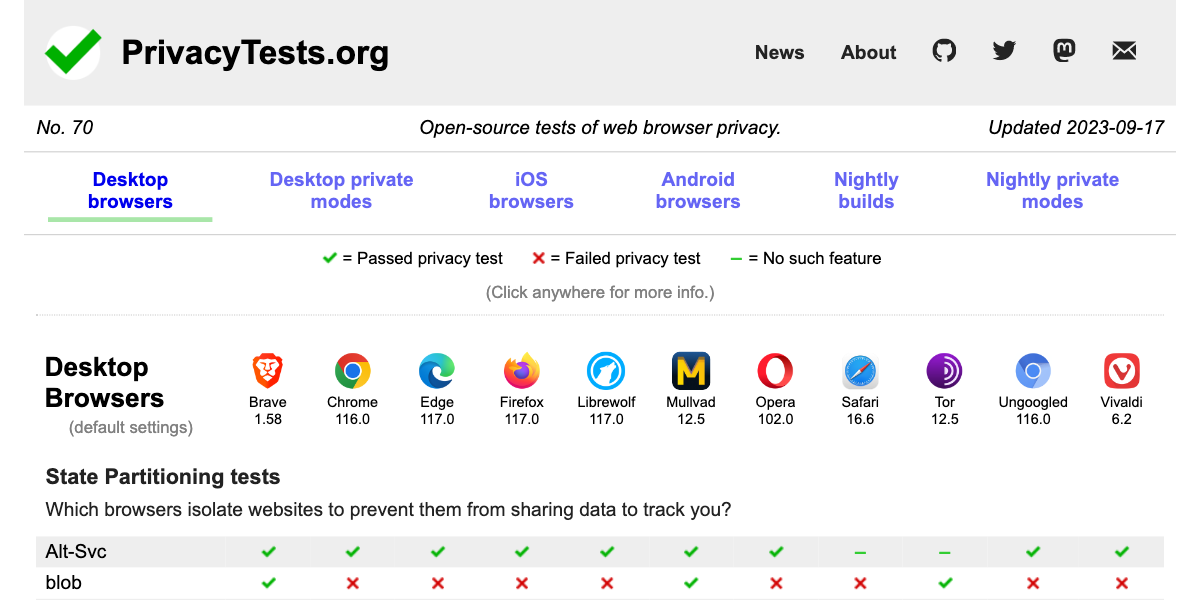- cross-posted to:
- [email protected]
- [email protected]
- cross-posted to:
- [email protected]
- [email protected]
Open-source tests of web browser privacy.
[EDIT] - Check the comments for more information and links 🔽 🔽 🔽
[Edit Edit] - Brave Browser caught adding its own referral codes to some cryptocurrency trading sites - More in the comments 🔽 🔽 🔽
Stop promoting brave, it’s a scam
and has an a-hole ceo. It uses chromium so double spyware and dependencies
So brave.
This was garbage every time it was posted before, and it’s still garbage.
Some of these test cases don’t matter if you just use uBlock Origin.
tor, mullvad, or librewolf i would say
deleted by creator
I don’t understand the ones where a browser doesn’t have the feature so it gets a green dash versus a green check. I’d assume not having a feature should just be considered failing. What’s the distinction?
Who watches the watchers.
Either the watchers watch eachother, or the great kraken watches us all
Vivaldi on why this test is misleading https://vivaldi.com/security/common-questions/#privacytests
Also this doesn’t account for the test choosing bad defaults. Defaults aren’t as important in vivaldi, as it’s made for power users.
if it’s made for power users why is it proprietary software? Vivaldi is yet another chromium browser with a fancy skin.
deleted by creator
This is a very ignorant response. Do you really think it’s that hard to include some heuristics? This was a very deliberate decision by the team
deleted by creator
Some of the items on that list are kinda weird. Why would I want to block a website from knowing my screen size?
Window sizes can vary widely and if you come from the same IP with the same exact window size (1033x832 for example) then people wanting to track you for ads etc will have a higher degree of confidence that you’re the same person. It’s part of “browser fingerprinting”, which can also include things like the extensions you have installed: https://amiunique.org/
Tracking/advertising corporations have developed techniques called ‘browser fingerprinting’ where innocuous seeming things like screen size and the fonts you ahve installed on your system can be used to uniquely identify you and track you across the internet even without cookies or anything like that.
It’s one of the metrics used to build unique identifiers (amongst many many others).
LibreWolf should be on the list.
No, and no other forks of Firefox should be either. Why don’t you guys get that you can do the same stuff with Firefox as all these different forks do, and still get same day updates and security patches?
Because its so hard to configure something on my mother’s laptop that stays on a different continent, cannot figure out how to share screen. There is value in knowing which browser is better out of the box, so I can set it and forget it on any computer that’s not mine.
There’s still some value that “private” forks add to the list - you can see how well a tweaked Firefox can perform.
Specially relevant in this page because this test uses Firefox as is, without installing uBlock Origin, which is ultra basic advice for privacy. IMO they do this to benefit Brave, but whatever.
Why are the three Chrome derivatives missing features Chrome has? Is it a porting issue or are they just that far behind on pulling in upstream changes?
They use Chromium, not Chrome. Chrome is Google’s proprietary version, while Chromium is the open source version.
Still pretty proprietary in my books














